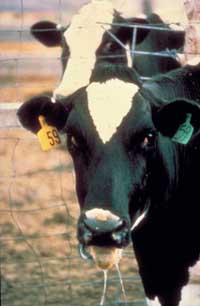Foot-and-mouth lab says it has found no biosecurity breach
A vaccine laboratory at the center of an outbreak of foot and mouth disease said Monday it had found no evidence of a breach in biosecurity, as government officials assessed links between the facility and infected cattle.

Veterinary experts matched a strain found last week in cattle on a farm outside Wanborough, 30 miles (50 kilometers) southwest of London, to a laboratory close by, which is used to produce vaccine against the disease.
Officials at Britain's agriculture department said the strain of foot-and-mouth disease was identical to one used at a site 4 miles (6 kilometers) away, which is shared by the government's Institute for Animal Health and a private pharmaceutical company, Merial Animal Health - the British arm of Duluth, Georgia-based Merial Ltd.
Merial Animal Health managing director David Biland said Monday initial inquiries have shown there have been no failures in security procedures at the plant.
The site "operates to the very highest international standards, and we have complete confidence in the integrity of our operation here," Biland said.
"To date our investigations continue to show no breach in our procedures. However, it is still too early in this investigation for anyone to determine the cause of the outbreak," he said.
The Institute for Animal Health, or IAH, said a check of records had found "limited use" of the virus in the past four weeks.
Environment Secretary Hilary Benn told British Broadcasting Corp. television it was not yet clear whether the IAH or Merial were directly linked to the outbreak.
If the outbreak is found to be linked to one of the two sites, it is likely to mean the infection will be contained to nearby cattle, reducing the risks of a repeat of mass outbreaks in 2001, when 7 million animals were culled and incinerated on pyres dotted across the landscape, devastating agriculture and rural tourism in Britain.
Foot-and-mouth disease affects cloven-hoofed animals including cows, sheep, pigs and goats, but does not typically affect humans.
The Department for the Environment, Food and Rural Affairs, or DEFRA, said around 120 cows had been slaughtered after the virus had been identified.
Prime Minister Gordon Brown, who broke off a family holiday in Dorset, southern England, to lead the response to the outbreak, said he hoped to have an initial report from Health and Safety officials within 48 hours.
Britain has banned exports of livestock, meat and milk and halted the movement of cattle, sheep, goats and pigs nationwide to prevent the spread of the virus.
The United States and Japan immediately banned British pigs and pork products. British beef is already banned in both countries because of mad cow disease. The South Korean government banned imports of British pork and pigs, the Agriculture Ministry said Monday. The 27-nation European Union is likely to ban British livestock imports Monday.
Subscribe to Pravda.Ru Telegram channel, Facebook, RSS!


